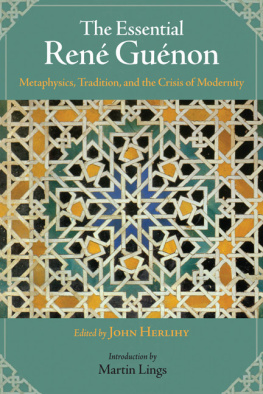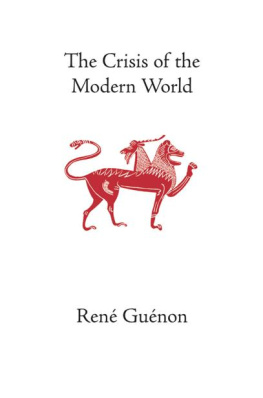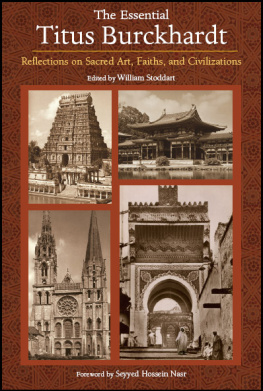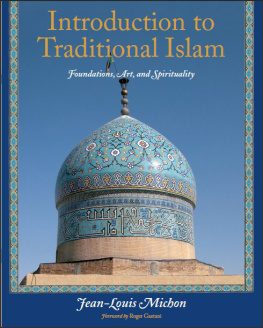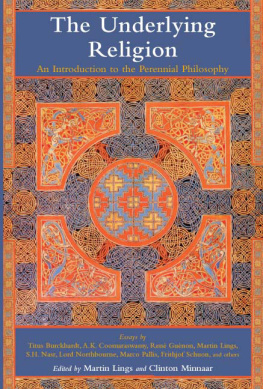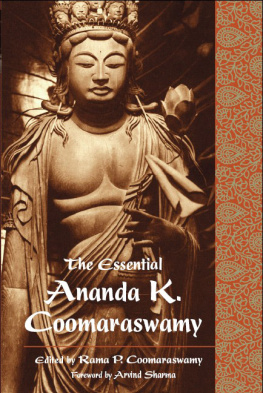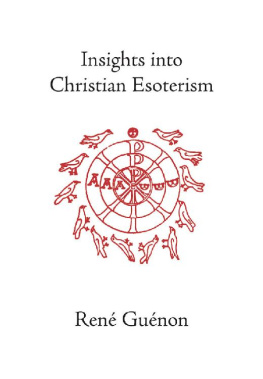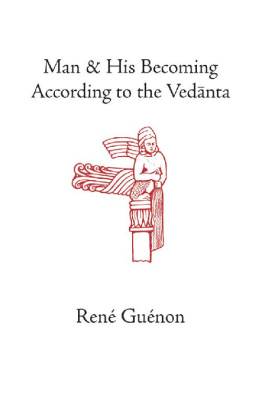APPENDIX 1: BIOGRAPHY OF REN GUNON
Ren Gunon was born in Blois, France, in 1886. He grew up in a strict Catholic environment and was schooled by Jesuits. As a young man he moved to Paris to take up studies in mathematics at the College Rollin. However, his energies were soon diverted from academic studies and in 1905 he abandoned his formal higher education studies. Gunon submerged himself in certain currents of French occultism and became a leading member in several secret organizations such as theosophical, spiritualistic, masonic, and gnostic societies. In June, 1909 Gunon founded the occultist journal La Gnose. It lasted a little over two years and carried most of Gunons writings from this period.
Although Gunon was later to disown the philosophical and historical assumptions on which such occultist movements were built, and to contrast their counterfeit spirituality with what he came to see as genuine expressions of traditional esoterism, he always steadfastly opposed contemporary European civilization. There have been suggestions that during this period Gunon received either a Taoist or an Islamic initiationor both. Whitall Perry has suggested that the catalyzing element was Gunons contact with representatives of the Advaita school of Vedanta.2 It was during this period that he embarked on a serious study of the doctrines of Taoism, Hinduism, and perhaps Islam.
Gunon emerged now from the rather secretive and obscure world of the occultists and moved freely in an intensely Catholic milieu, leading a busy social and intellectual life. He was influenced by several prominent Catholic intellectuals of the day, among them Jacques Maritain, Fathers Peillaube and Sertillanges, and one M. Milhaud, who conducted classes at the Sorbonne on the philosophy of science. The years 1912 to 1930 are the most public of Gunons life. He attended lectures at the Sorbonne, wrote and published widely, gave at least one public lecture, and maintained many social and intellectual contacts. He published his first books in the 1920s and soon became well-known for his work on philosophical and metaphysical subjects.
Whatever Gunons personal commitments may have been during this period, his thought had clearly undergone a major shift away from occultism and toward an interest in esoteric sapiential traditions within the framework of the great religions. One central point of interest for Gunon was the possibility of a Christian esoterism within the Catholic tradition. (He always remained somewhat uninformed on the esoteric dimensions within Eastern Orthodoxy). Gunon envisaged, in some of his work from this period, a regenerated Catholicism, enriched and invigorated by a recovery of its esoteric traditions, and repaired through a prise de conscience. He contributed regularly to the Catholic journal Regnabit, the Sacre-Coeur review founded and edited by P. Anizan. These articles reveal the re-orientation of Gunons thinking in which tradition now becomes the controlling theme. Some of these periodical writings found their way into his later books.
The years 1927 to 1930 mark another transition in Gunons life, culminating in his move to Cairo in 1930 and his open commitment to Islam. A conflict between Anizan (whom Gunon supported) and the Archbishop of Reims, and adverse Catholic criticism of his book The King of the World (1927), compounded a growing disillusionment with the Church and hardened Gunons suspicion that it had surrendered to the temporal and material. In January 1928 Gunons wife died rather abruptly, and, following a series of fortuitous circumstances, Gunon left on a three-month visit to Cairo. He was to remain there until his death in 1951.
In Cairo Gunon was initiated into the Sufic order of Shadhilites and invested with the name Abdel Wahed Yahya. He married again and lived a modest and retiring existence. Such was his anonymity that an admirer of his writings was dumbfounded to discover that the venerable next-door neighbor whom she had known for years as Sheikh Abdel Wahed Yahya was in reality Ren Gunon.3
A good deal of Gunons energy in the 1930s was directed to a massive correspondence that he carried on with his readers in Europe, people often in search of some kind of initiation, or simply pressing inquiries about subjects dealt with in his books and articles. Most of Gunons published work after his move to Cairo appeared in tudes Traditionnelles (until 1937 titled Le Voile dIsis), a formerly theosophical journal that was transformed under Gunons influence into the principal European forum for traditionalist thought. It was only the war that provided Gunon enough respite from his correspondence to devote himself to the writing of some of his major works including, The Reign of Quantity (1945).
In his later years Gunon was much more preoccupied with questions concerning initiation into authentic esoteric traditions. He published at least twenty-five articles in tudes Traditionnelles dealing with this subject, from many points of view. Although he had found his own resting-place within the fold of Islam, Gunon remained interested in the possibility of genuine initiatic channels surviving within Christianity. He also never entirely relinquished his interest in Freemasonry, and returned to this subject in some of his last writings. Only shortly before his death did he conclude that there was no effective hope of an esoteric regeneration within either masonry or Catholicism.
Gunon was a prolific writer. He published seventeen books during his lifetime, and at least eight posthumous collections and compilations have since appeared. The oeuvre exhibits certain recurrent motifs and preoccupations and is, in a sense, all of a piece. Gunons understanding of tradition is the key to his work. As early as 1909 we find Gunon writing of... the Primordial Tradition which, in reality, is the same everywhere, regardless of the different shapes it takes in order to be fit for every race and every historical period.4 As Gai Eaton has observed, Gunon believes that there exists a Universal Tradition, revealed to humanity at the beginning of the present cycle of time, but partially lost.... [His] primary concern is less with the detailed forms of Tradition and the history of its decline than with its kernel, the pure and changeless knowledge which is still accessible to man through the channels provided by traditional doctrine.5
Gunons work, from his earliest writings in 1909 onward, can be seen as an attempt to give a new expression and application to the timeless principles which inform all traditional doctrines. In his writings he ranges over a vast terrainVedanta, the Chinese tradition, Christianity, Sufism, folklore and mythology from all over the world, the secret traditions of gnosticism, alchemy, the Kabbalah, and so on, always intent on excavating their underlying principles and showing them to be formal manifestations of the one Primordial Tradition. Certain key themes run through all of his writings, and one meets again and again such notions as these: the concept of metaphysics as transcending all other doctrinal orders; the identification of metaphysics and the formalization, so to speak, of gnosis (or jna if one prefers); the distinction between exoteric and esoteric domains; the hierarchic superiority and infallibility of intellective knowledge; the contrast of the modern Occident with the traditional Orient; the spiritual bankruptcy of modern European civilization; a cyclical view of time, based largely on the Hindu doctrine of cosmic cycles; and a contra-evolutionary view of history.
Gunon repeatedly turned to oriental teachings, believing that it was only in the East that various sapiential traditions remained more or less intact. It is important not to confuse this Eastward-looking stance with the kind of sentimental exotericism nowadays so much in vogue. As Coomaraswamy noted, If Gunon wants the West to turn to Eastern metaphysics, it is not because they are Eastern but because this

